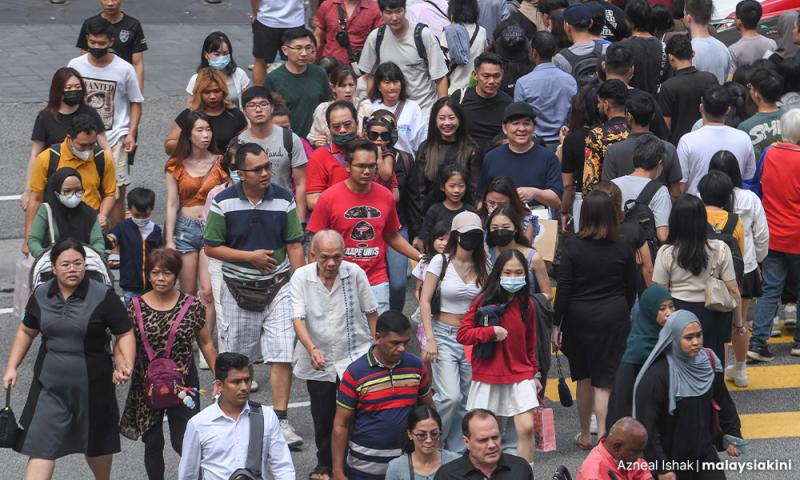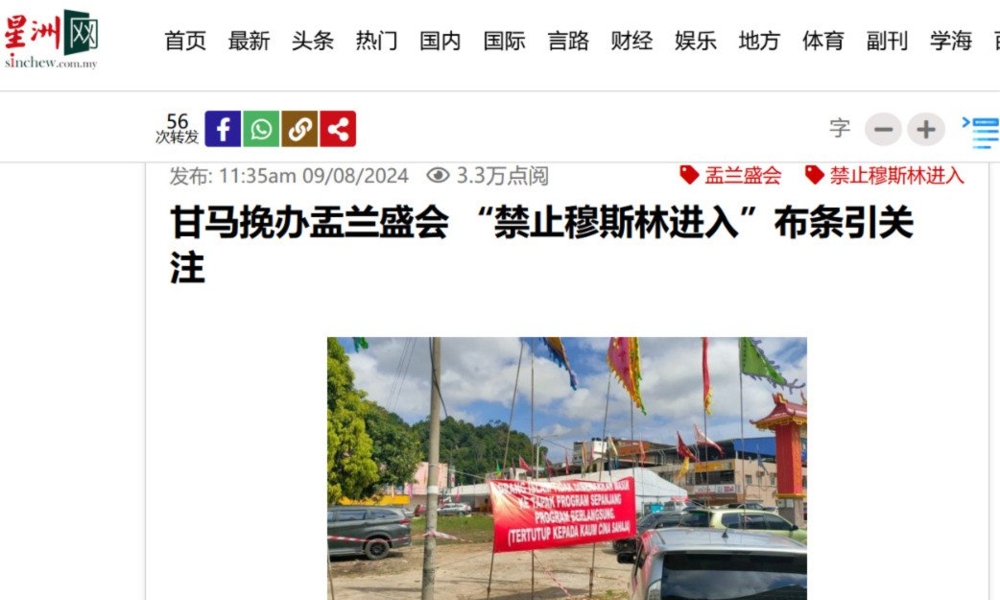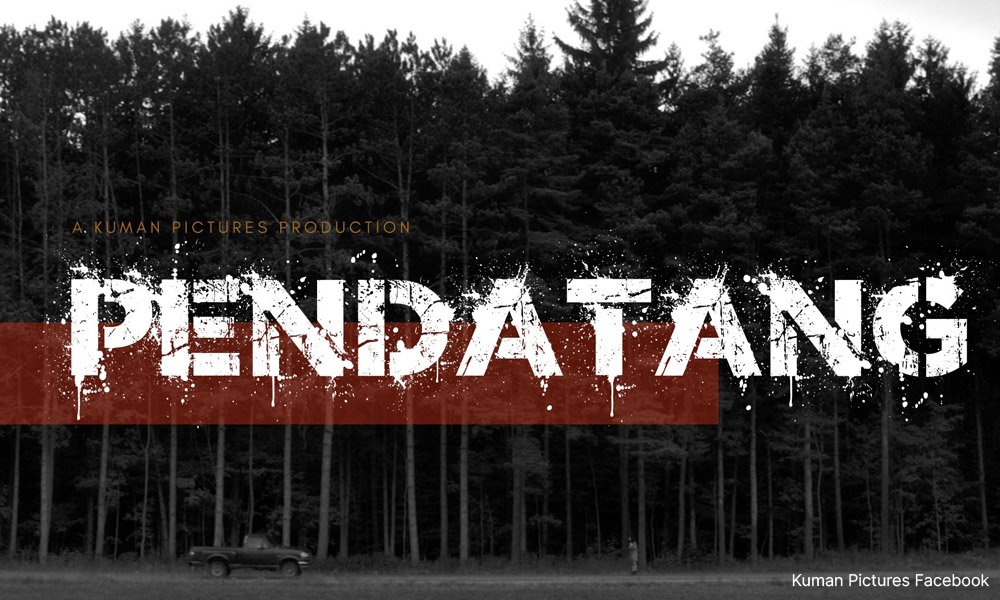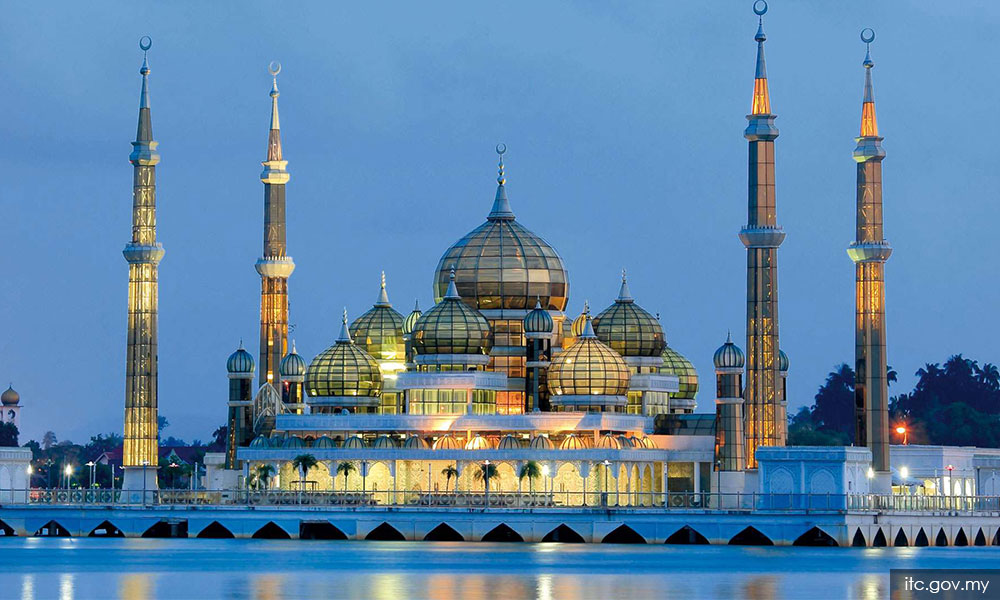
Ooi Kok Hin
Published: Aug 14, 2024 1:26 PM
COMMENT | Years ago, I was minding my own business at a neighbourhood playground and drinking air kotak (box drink) on a hot day after dropping off a friend at his house.
A man saw me, crossed the road, and walked some 50m, just to shout at me, “It is forbidden to drink publicly in the month of Ramadan!”
Startled, I told him he had been mistaken about my identity then. He refused to back down, saying “This is a Muslim-majority neighbourhood and you cannot drink in public.” He told me to go back to my car or house to drink water.
At this point, I was more curious than upset at his audacity. I said I knew the laws, there is no such law prohibiting me from drinking publicly but this vigilante insisted he was right.
That happened in Cheras, Kuala Lumpur. When I tell this story to friends, some of them expect such incidents to occur in conservative states.
I think we underestimate how widespread religious policing in public spaces has become by both state authorities and public vigilantes.
Seeds planted
Why have some vigilantes become emboldened to take matters into their own hands? Because the state has been planting seeds in their mind to do so.
There was a big signboard in a public park in Kuala Lumpur, stating “Jauhilah diri anda daripada jenayah syariah” (Stay away from syariah crimes) and listed a list of prohibited behaviours including “perbuatan tidak sopan di tempat awam” (indecent behaviour in a public space).
Published: Aug 14, 2024 1:26 PM
COMMENT | Years ago, I was minding my own business at a neighbourhood playground and drinking air kotak (box drink) on a hot day after dropping off a friend at his house.
A man saw me, crossed the road, and walked some 50m, just to shout at me, “It is forbidden to drink publicly in the month of Ramadan!”
Startled, I told him he had been mistaken about my identity then. He refused to back down, saying “This is a Muslim-majority neighbourhood and you cannot drink in public.” He told me to go back to my car or house to drink water.
At this point, I was more curious than upset at his audacity. I said I knew the laws, there is no such law prohibiting me from drinking publicly but this vigilante insisted he was right.
That happened in Cheras, Kuala Lumpur. When I tell this story to friends, some of them expect such incidents to occur in conservative states.
I think we underestimate how widespread religious policing in public spaces has become by both state authorities and public vigilantes.
Seeds planted
Why have some vigilantes become emboldened to take matters into their own hands? Because the state has been planting seeds in their mind to do so.
There was a big signboard in a public park in Kuala Lumpur, stating “Jauhilah diri anda daripada jenayah syariah” (Stay away from syariah crimes) and listed a list of prohibited behaviours including “perbuatan tidak sopan di tempat awam” (indecent behaviour in a public space).

A banner in Kemaman, Terengganu warning off Muslims from the Hungry Ghost Festival
The Federal Territory Islamic Affairs Department, in collaboration with Dewan Bandaraya Kuala Lumpur, a secular administrative entity that operates the park and is funded by Malaysians from different ethnicities and religions, had put it up.
I felt sad reading the news in Terengganu about the banners put up by an organiser of the Hungry Ghost Festival. The banner states, “Non-Muslims only. Chinese only. Muslims not allowed to enter.”
They prohibited Muslims from entering the venue after a temple in Kuala Terengganu was not granted an exemption for women to perform at a celebration event for the festival.
After Seputeh MP Teresa Kok questioned why the restrictive rules that were meant for Muslims were being applied to non-Muslims, the state exco Wan Sukairi Wan Abdullah reasoned that it was because the performance was held in an open space accessible to all, including Muslims.
It is noteworthy this restriction is not enforced by an Islamic authority or via an Islamic law but by the Kuala Terengganu City Council.
When ideologues take over
When ideologues run a “secular” administrative entity, public space is turned into a battleground for their ideology to pervade, encroach and control the way lives should be lived – and that includes what, when, and where we are drinking or watching.
I felt sad because we have accepted segregation as an acceptable compromise to the Islamisation of public space. Instead of attending and experiencing each other’s festivals and cultures, we are forced to gatekeep and segregate.
The Terengganu incident and the eventual resort to segregation reminds me of the first fully crowdfunded local film “Pendatang”, a dystopian thriller set in a racially segregated country produced by Amir Muhammad’s Kuman Pictures.
The Federal Territory Islamic Affairs Department, in collaboration with Dewan Bandaraya Kuala Lumpur, a secular administrative entity that operates the park and is funded by Malaysians from different ethnicities and religions, had put it up.
I felt sad reading the news in Terengganu about the banners put up by an organiser of the Hungry Ghost Festival. The banner states, “Non-Muslims only. Chinese only. Muslims not allowed to enter.”
They prohibited Muslims from entering the venue after a temple in Kuala Terengganu was not granted an exemption for women to perform at a celebration event for the festival.
After Seputeh MP Teresa Kok questioned why the restrictive rules that were meant for Muslims were being applied to non-Muslims, the state exco Wan Sukairi Wan Abdullah reasoned that it was because the performance was held in an open space accessible to all, including Muslims.
It is noteworthy this restriction is not enforced by an Islamic authority or via an Islamic law but by the Kuala Terengganu City Council.
When ideologues take over
When ideologues run a “secular” administrative entity, public space is turned into a battleground for their ideology to pervade, encroach and control the way lives should be lived – and that includes what, when, and where we are drinking or watching.
I felt sad because we have accepted segregation as an acceptable compromise to the Islamisation of public space. Instead of attending and experiencing each other’s festivals and cultures, we are forced to gatekeep and segregate.
The Terengganu incident and the eventual resort to segregation reminds me of the first fully crowdfunded local film “Pendatang”, a dystopian thriller set in a racially segregated country produced by Amir Muhammad’s Kuman Pictures.

The ‘Pendatang’ movie poster
Indeed, the notion that Islamisation does not affect non-Muslims only works under the assumption of segregation where spaces between Muslims and non-Muslims are exclusive, not overlapping.
Researcher Aziff Azuddin studies “the syariahisation of spaces” where sociocultural norms and local government laws are being reshaped with syariah as the standard. He argues this contributes to societal polarization and a setback to Malaysia as a multicultural project.
The Terengganu incident supports his thesis because:
What is at first publicly prohibited can be easily expanded to encroach on personal or private space and behaviours.
To illustrate how Islamisation starts out by shrinking civil liberty for Muslims and subsequently extending to everyone else, shopping premises including supermarkets in Terengganu and Kelantan are directed to cease operation for two hours every Friday starting to deter and act against Muslims who did not perform Friday prayers.
Indeed, the notion that Islamisation does not affect non-Muslims only works under the assumption of segregation where spaces between Muslims and non-Muslims are exclusive, not overlapping.
Researcher Aziff Azuddin studies “the syariahisation of spaces” where sociocultural norms and local government laws are being reshaped with syariah as the standard. He argues this contributes to societal polarization and a setback to Malaysia as a multicultural project.
The Terengganu incident supports his thesis because:
- Islamisation controls the use of public space by narrowing what is and is not permissible to be publicly displayed or performed;
- Islamisation policies put the responsibility of upholding and enforcing it on everyone. For example, a non-Muslim trader selling food to a Muslim customer during Ramadan risks being accused of complicity and conspiring.
- Restaurants are so afraid of Islamic authorities and far-right vigilantes that they put up signs to say no to in-house dining for Muslim customers, even for those with valid reasons not to fast such as female Muslims on period, the sick and the elderly. It is too much trouble to deal with “controversy” and we as a society have decided it’s better not just avoid it altogether. This is not even mentioning those who “look” like Malay or Muslim and have to face interrogations;
- Islamisation allows concentration and expansion of power by religious authorities and also takes away resources from non-religious authorities whose mandate is not supposed to be moral policing.
- Islamisation disempowers Muslims who are deprived of choice on what they can do with their time and space. Far-right groups do not represent all Muslims, let alone deciding on their behalf.
What is at first publicly prohibited can be easily expanded to encroach on personal or private space and behaviours.
To illustrate how Islamisation starts out by shrinking civil liberty for Muslims and subsequently extending to everyone else, shopping premises including supermarkets in Terengganu and Kelantan are directed to cease operation for two hours every Friday starting to deter and act against Muslims who did not perform Friday prayers.

Masjid Kristal in Terengganu
It wasn’t always like that – the new rulings were enforced from the mid-2010s. It seems we are heading the opposite way compared to even Saudi Arabia which relaxed its rules in 2021 to allow shops to remain open during prayer times.
This growing conservatism is not just happening in Cheras, Kota Bahru or Kuala Terengganu. Kedah has banned open-air concerts since 2022.
The menteri besar also sang the same tune of “Oh it’s not that bad, you can still do it by adhering to our new conservative guideline, or do it in a private space. We are not really encroaching on anyone’s rights.”
Dismissing critics as Islamophobic
In today’s Malaysia, to question Islamisation is to be accused of Islamophobia. In Western countries where Muslim communities are the minority groups, Islamophobia is a legitimate phenomenon where Muslims are victims of hate crime and targeted harassment.
A white man who gunned down his three Muslim neighbours in Chapel Hill in 2015 shocked many of my Muslim and non-Muslim friends in the US.
But Islamophobia has been reduced to a lazy shorthand in Malaysia to label critics of Islamisation and to deflect legitimate criticism in a country where Muslims are the dominant majority and Islamic authorities possess so much power with so little scrutiny and accountability.
Academic Hew Wai Weng argues right-wing propaganda in Malaysia has appropriated decolonial idioms and “progressive” discourse such as Islamophobia to promote their ultra-nationalist, majoritarian and nativist agenda.
The constant retreat of liberal norms, and the failure to reclaim public space from the far-right, entail surrendering public space to be defined and dictated by others.
All these are reminiscent of pre-reformasi Indonesia when the minorities’ cultural and religious expressions were prohibited from public space.
Did the previous sentence describe 1960s Indonesia or 2024 Terengganu? It feels like we are dragged into the past, or maybe that’s just authoritarian nostalgia in some of us.
OOI KOK HIN is a political sociologist who dabbles in civil society.
It wasn’t always like that – the new rulings were enforced from the mid-2010s. It seems we are heading the opposite way compared to even Saudi Arabia which relaxed its rules in 2021 to allow shops to remain open during prayer times.
This growing conservatism is not just happening in Cheras, Kota Bahru or Kuala Terengganu. Kedah has banned open-air concerts since 2022.
The menteri besar also sang the same tune of “Oh it’s not that bad, you can still do it by adhering to our new conservative guideline, or do it in a private space. We are not really encroaching on anyone’s rights.”
Dismissing critics as Islamophobic
In today’s Malaysia, to question Islamisation is to be accused of Islamophobia. In Western countries where Muslim communities are the minority groups, Islamophobia is a legitimate phenomenon where Muslims are victims of hate crime and targeted harassment.
A white man who gunned down his three Muslim neighbours in Chapel Hill in 2015 shocked many of my Muslim and non-Muslim friends in the US.
But Islamophobia has been reduced to a lazy shorthand in Malaysia to label critics of Islamisation and to deflect legitimate criticism in a country where Muslims are the dominant majority and Islamic authorities possess so much power with so little scrutiny and accountability.
Academic Hew Wai Weng argues right-wing propaganda in Malaysia has appropriated decolonial idioms and “progressive” discourse such as Islamophobia to promote their ultra-nationalist, majoritarian and nativist agenda.
The constant retreat of liberal norms, and the failure to reclaim public space from the far-right, entail surrendering public space to be defined and dictated by others.
All these are reminiscent of pre-reformasi Indonesia when the minorities’ cultural and religious expressions were prohibited from public space.
Did the previous sentence describe 1960s Indonesia or 2024 Terengganu? It feels like we are dragged into the past, or maybe that’s just authoritarian nostalgia in some of us.
OOI KOK HIN is a political sociologist who dabbles in civil society.

Anwar Ibrahim as well as PUS have learnt very well from Turkey Erdogan AKP's success at implementing such creeping Civil Islamisation.
ReplyDeleteTurkey's Constitution specifically defines the nation as Secular..However AKP has successfully built Islamic standards and mores and restrictions into Civil regulations all over Turkey,.
Even though Constitutionally the AKP Government cannot enforce Syaria law in Turkey, they can enforce "Syaria by other means" via civil regulations.